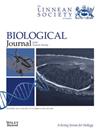Spatiotemporal patterns of historical connections between Amazonian and Atlantic forests
IF 1.5
3区 生物学
Q3 EVOLUTIONARY BIOLOGY
引用次数: 0
Abstract
Abstract Despite the disjunct distribution of the Amazonian and the Atlantic forests, three historical connections between those biomes have been hypothesized: through Northeast Brazil, the Brazilian Cerrado, and the Southeast–Northwest. Temporal variation has been suggested to occur in these connections, with recent connections for the Northeast and older connections for the Southeast–Northwest. We tested for the hypothesis of temporal variation in these connections using Neotropical mammals as a study group. Phylogenetic and spatial data of sister groups from each forest were combined to access the spatiotemporal patterns of these connections. The relationship between distance route and divergence times was tested using linear regression. The results revealed that the previously suggested spatiotemporal pattern was corroborated only for Rodentia but not for Didelphimorphia and Chiroptera, showing both old and recent connections for all routes. In addition, each family revealed specific connections at different times. We refute the previously proposed absence of old connections through the Northeast route. Rather, temporal variation in the Northeast differs among the mammalian groups according to their evolutionary histories. Owing to the biogeographical history of each group, different connections were found at different times. Therefore, connections between these forests cannot be explained by a single spatiotemporal pattern.亚马逊和大西洋森林之间历史联系的时空格局
尽管亚马逊森林和大西洋森林的分布是不连贯的,但这些生物群系之间有三个历史联系:通过巴西东北部、巴西塞拉多和东南-西北。时间变化已被认为发生在这些连接中,最近的连接是东北,而较早的连接是东南-西北。我们以新热带哺乳动物为研究对象,对这些联系的时间变化假设进行了检验。将每个森林的姊妹类群的系统发育和空间数据结合起来,以获得这些联系的时空模式。用线性回归检验了距离路线与发散次数之间的关系。结果表明,先前提出的时空模式仅在啮齿目中得到证实,而在双翅目和翼翅目中没有得到证实,显示了所有路线的新旧联系。此外,每个家庭在不同的时间显示出特定的联系。我们反驳先前提出的东北路线没有旧连接的建议。相反,东北哺乳动物群体的时间变化根据它们的进化历史而不同。由于各类群的生物地理历史,在不同时期发现了不同的联系。因此,这些森林之间的联系不能用单一的时空模式来解释。
本文章由计算机程序翻译,如有差异,请以英文原文为准。
求助全文
约1分钟内获得全文
求助全文
来源期刊
CiteScore
4.30
自引率
10.50%
发文量
140
审稿时长
3-6 weeks
期刊介绍:
The Biological Journal of the Linnean Society is a direct descendant of the oldest biological journal in the world, which published the epoch-making papers on evolution by Darwin and Wallace. The Journal specializes in evolution in the broadest sense and covers all taxonomic groups in all five kingdoms. It covers all the methods used to study evolution, whether whole-organism or molecular, practical or theoretical.d.

 求助内容:
求助内容: 应助结果提醒方式:
应助结果提醒方式:


